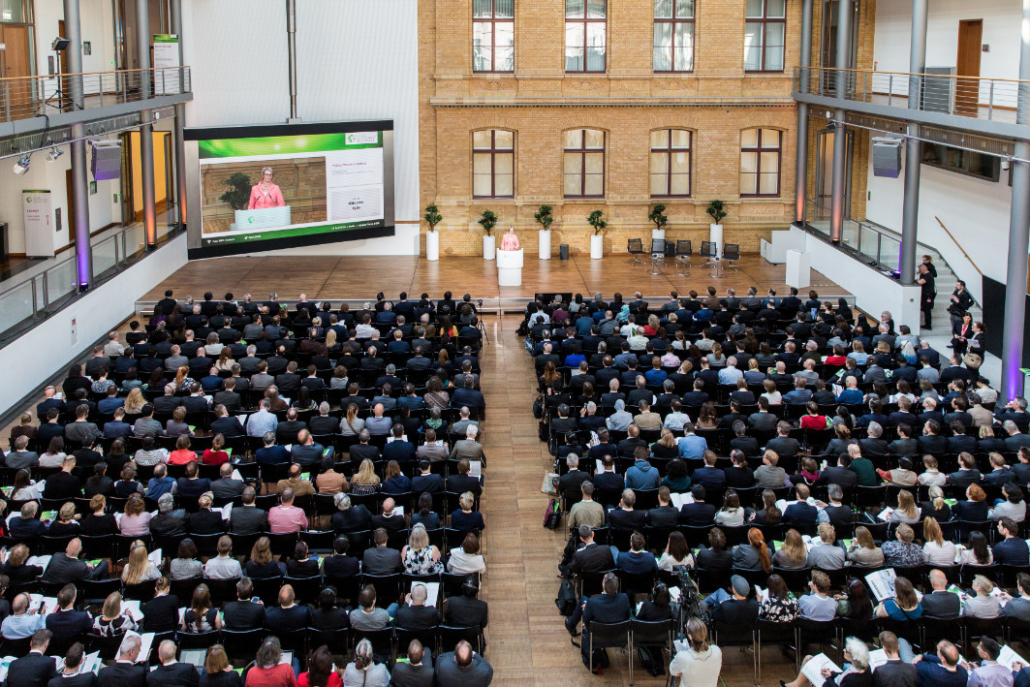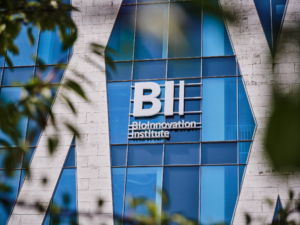
GBS 2018: Bioeconomy leaders foster shift to sustainable industry production
International collaboration is needed to secure living of the growing world population without collapse of the planet's resources, biodiversity and climate. A communique published at the end of the Global Bioeconomy Summit (GBS) outlines policy measures needed to create a biobased economy for all.
For two days, 800+ policy leaders, NGO and industry representatives from over 70 nations met to discuss the challenges and opportunities of the shift from the current unsustainable industry production to a sustainable bio-based economy at the 2nd Global Bioeconomy Summit (GBS, 19 – 20. April 2018) in Berlin. Since the German Bioeconomy Council launched the world policy meeting for bioeconomy with support of the German Research Ministry in 2015, 49 nations have adopted national bioeconomy strategies, outlined in an study update published on occasion of the GBS. Japan is to join them next year, representatives from Japan’s Biotech Organisation told European Biotechnology at the meeting.
As there are huge regional differences in the way and focus nations pursue the shift to sustainable food and industry production, international collaboration and best-practice policies are needed to met the overall goal of fighting global threats such as climate change, hunger, loss of biodiversity and depletion of natural resources, or inequality. A communique published at the end of the GBS, recommends to coordinate bioeconomy R&D, governance and capacity building internationally to ensure the set up of a "Sustainable Bioeconomy for All."
Damages to our biosphere resulting from unsustainable resource use have become more tangible globally. "African species are disappearing at double rate of the world average", said Ameenah Gurib-Fakim, ex-President of Mauritius. "A climate change of 1.5°C will have a direct impact on Africa’s GDP", she added. "The exponentional growth of energy consumption during the past seven decades is discharging the battery of biologically stored energies built up by our planet in 4.5 billion years of evolution", warned John Schramski, engineer and ecologist from University Georgia. "We already see the first signs of instability of our biosphere. We must change our lifestyles and have to slow down," he stressed. Book author Ian Goldin, ex-policy advisor of Nelson Mandela and globalisation expert, told European Biotechnology that the current economies of Sccale can’t lead to sustainability. "We can have good and bad effects from connectivity and progress in genomics, he said and pointing to globalisation: "The choices we make touch others in the world."
While stakeholders such as Navi Radjou called for low tech innovation – such as a 20 cent centrifuge or a fridge running without electricity – to be developed within a "frugal concious bioeconomy", most of the key note speakers agreed that (high-tech) R&D will form the basis of processing natural resources more effectively and help establish circularity improving agriculture, industrial production and health globally. However, everybody seemed to agree to Radjou’s conclusion "we must create more value with less resources." Stakeholders from resource-rich tropical countries, such as Ecuador’s Enviroment Minister, Tarsicio Granizo, underlined that for them establishing the bioeconomy in their countries holds the prospect of economic growth. With an eye to benefit sharing, Ameenah Gurib-Fakim said "we must merge the African traditional knowledge with technology to plant a tree together."
"Highly innovative (meta)genomics technologies and bioinformatics are reality today" in enzyme optimisation for food, textile or bio-based energy production, Thomas Videbæk, Executive Vice President & COO for Research, Innovation & Supply at Novozymes. told European Biotechnology. Rob Carlson, Managing Director of Bioeconomy Capital, which invests in synthetic biology companies, said that microbial high-value products that can be produced in low-investment plants like breweries will lead to rapid industry adoption.
The GBS Communique recommends to create a common knowledge base for the bioeconomy in order to internationally coordinate the development of policies. It calls for monitoring the status quo and progress of bioeconomy to be able to recognize unwanted side-effects and to actively drive bioeconomies into the right direction.
On occasion of the GBS, German research minister Anja Karliczek announced an update of Germany’s strategic research agenda, the start of a broad stakeholder discussion including the civil society to define the goals of an agenda "From Biology to Innovation" and the start of a project aimed to monitor the development of the bioeconomy. Previously, she had underlined her clear committment to R&D on CRISPR-based genome engineering technologies even in crops. It may be not used it in Germany, due to public concerns. However, application of such technologies in other parts of the world may be helpful. German Agriculture Minister, Julia Klöckner, said at the GBS "We want to master the shift to a biobased economy."




 photo credit: BioInnovation Institute/Esben Zøllner Olesen
photo credit: BioInnovation Institute/Esben Zøllner Olesen